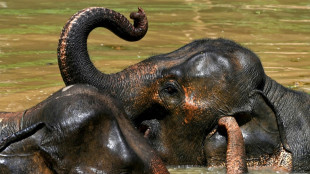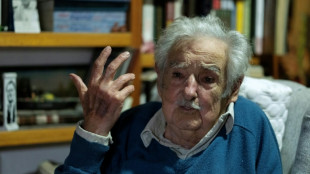
-
 Floods displace 122,000 people in Malaysia
Floods displace 122,000 people in Malaysia
-
Taiwan's Lai set to depart on Pacific island tour

-
 American Johnston reels in Herbert at Australian Open
American Johnston reels in Herbert at Australian Open
-
Hawks top Cavs again to advance in NBA Cup, Boston beat Bulls

-
 South Korea star Jung Woo-sung apologises after baby scandal
South Korea star Jung Woo-sung apologises after baby scandal
-
Romania's economic troubles fuel far-right rise

-
 England on verge of wrapping up first New Zealand Test
England on verge of wrapping up first New Zealand Test
-
Icelanders head to the polls after government collapse

-
 England strike twice to have New Zealand in trouble in first Test
England strike twice to have New Zealand in trouble in first Test
-
Researchers analyse DNA from dung to save Laos elephants

-
 North Korea's Kim, Russian minister agree to boost military ties
North Korea's Kim, Russian minister agree to boost military ties
-
Brook's 171 gives England commanding 151-run lead over New Zealand

-
 Kamala's coda: What's next for defeated US VP Harris?
Kamala's coda: What's next for defeated US VP Harris?
-
Chiefs hold off Raiders to clinch NFL playoff berth

-
 Australia's Hazlewood out of 2nd India Test
Australia's Hazlewood out of 2nd India Test
-
Trudeau in Florida to meet Trump as tariff threats loom

-
 Jihadists, allies breach Syria's second city in lightning assault
Jihadists, allies breach Syria's second city in lightning assault
-
Trudeau in Florida to meet Trump as tariff threats loom: media

-
 Hunter shines as Hawks top Cavs again
Hunter shines as Hawks top Cavs again
-
Southampton denied shock Brighton win by dubious VAR call

-
 Alarm over high rate of HIV infections among young women, girls
Alarm over high rate of HIV infections among young women, girls
-
Swiss unveil Euro 2025 mascot Maddli

-
 Bears fire coach Eberflus after latest agonizing NFL defeat
Bears fire coach Eberflus after latest agonizing NFL defeat
-
Rallies mark one month since Spain's catastrophic floods

-
 Arnault family's Paris FC takeover completed
Arnault family's Paris FC takeover completed
-
Georgian police stage new crackdown on pro-EU protestors

-
 'We're messing up:' Uruguay icon Mujica on strongman rule in Latin America
'We're messing up:' Uruguay icon Mujica on strongman rule in Latin America
-
Liverpool dealt Konate injury blow

-
 Van Nistelrooy appointed Leicester manager
Van Nistelrooy appointed Leicester manager
-
Verstappen brought back to earth in Doha after F1 title party

-
 Global wine output to hit lowest level since 1961
Global wine output to hit lowest level since 1961
-
Norris boosts McLaren title hopes with sprint pole

-
 Big-hitting Stubbs takes satisfaction from grinding out Test century
Big-hitting Stubbs takes satisfaction from grinding out Test century
-
Romania recounts presidential ballots as parliamentary vote looms

-
 French skipper Dalin leads as Vendee Globe passes Cape of Good Hope
French skipper Dalin leads as Vendee Globe passes Cape of Good Hope
-
Chelsea not in Premier League title race, says Maresca

-
 Brazil's Bolsonaro aims to ride Trump wave back to office: WSJ
Brazil's Bolsonaro aims to ride Trump wave back to office: WSJ
-
France requests transfer of death row convict held in Indonesia: minister

-
 'Mamie Charge': Migrants find safe haven in Frenchwoman's garage
'Mamie Charge': Migrants find safe haven in Frenchwoman's garage
-
Iconic Uruguayan ex-leader hails country's swing left as 'farewell gift'

-
 Thousands rally in Georgia after violent police crackdown on pro-EU protesters
Thousands rally in Georgia after violent police crackdown on pro-EU protesters
-
Shared experiences make Murray 'perfect coach', says Djokovic

-
 Iran, Europeans to keep talking as tensions ratchet up
Iran, Europeans to keep talking as tensions ratchet up
-
Inflation-wary US consumers flock to 'Black Friday' deals

-
 France shows off restored Notre Dame after 'impossible' restoration
France shows off restored Notre Dame after 'impossible' restoration
-
South African bowlers strike after Sri Lanka set big target

-
 Namibia reopens polls after election chaos in ruling party test
Namibia reopens polls after election chaos in ruling party test
-
Georgia police arrest dozens in clashes with pro-EU protesters

-
 US stocks rise on Black Friday
US stocks rise on Black Friday
-
Leclerc on top for Ferrari in Qatar GP practice


'Robbing women': Japan's sperm donation law spurs controversy
Satoko Nagamura and her girlfriend conceived their son with donated sperm, but new legislation in Japan could effectively outlaw the procedure for lesbian couples and single women.
For decades, anonymous sperm donation has existed in a legal grey zone in Japan, with no law explicitly prohibiting it, but no framework to govern it either.
Legislation expected to be presented this year would regulate the procedure, including protecting the rights of children to know their biological parents and capping recipients from a single donor.
But a draft seen by AFP shows the law would only authorise the process for legally married couples, mostly those affected by male infertility. Japan does not recognise same-sex marriage, so lesbian couples and single women would be excluded.
To Nagamura, the draft is "tantamount to robbing women -- whether same-sex couples or single -- of their reproductive rights, and their desire to give birth to and raise children".
For nearly two decades, the 39-year-old dreamed of being a mother and the chance to "give birth with my body".
She and her partner Mamiko Moda, 42, initially considered overseas sperm banks, before turning to a male friend, encouraged by his willingness to have a relationship with the future child.
They are now the proud parents of a 10-month-old son, who smiles freely as his parents spoonfeed him with encouraging exclamations of "well done", as the family's two dogs look on jealously.
Institutions that offer sperm donation and insemination generally follow the guidelines of the Japan Society of Obstetrics and Gynaecology (JSOG) -- which serve as the basis for the new legislation restricting the process to married couples.
JSOG's guidelines are non-binding, but already carry enough weight that only a handful of doctors defy them to accommodate lesbians and single women.
If the law is enacted, "the few hospitals that have accepted us will no longer be able to do so", said Nagamura.
"There is a big difference between just going against the guidelines and doing something illegal", added Moda.
The couple also fears the new legislation could mean their child, conceived through artificial insemination using a sperm donor, could be stigmatised.
"Even though the way we achieved our pregnancy was not illegal at the time, the impression that we did something wrong, that this kid is somehow 'illegal', could emerge if that's how the law sees it," Moda said.
- 'Double-edged sword' -
Kozo Akino, a ruling-coalition lawmaker involved in drafting the legislation, argues that children's rights are most easily protected by "legally married parents with joint custody".
"Assisted reproductive technology should not be pursued at the expense of the well-being of children," he told AFP.
And some doctors think the law could help make the unregulated treatment more socially accepted, despite being limited to heterosexual married couples.
"My hope is that with the law, our treatment will be seen as more legitimate and become mainstream," said Mamoru Tanaka, an obstetrics professor at Tokyo's Keio University Hospital.
Keio is thought to have been the first medical institution in Japan to perform donor insemination in 1948, but it is no longer accepting new patients because of a donor shortage that followed an internal policy shift.
Since 2017, it has warned donors that their anonymity could be waived if children conceived from their sperm file legal suits. The resulting shortage of applicants means it carried out just 481 procedures for existing patients in 2019, down from 1,952 in 2016.
Patients would "hopefully be able to benefit from (a legal framework), but it's easier said than done", Tanaka said.
"There is a possibility that more people will be pushed underground, and in that sense, it's a double-edged sword," he told AFP.
- 'Whatever it takes' -
Already, some women and couples turn to unvetted sperm donors to avoid the complexities and restrictions of the existing system.
A casual Twitter search turns up hundreds of accounts touting the handsomeness, college degrees and athletic talent of would-be donors, who typically offer recipients either cups of semen for self-insemination, or impregnation via intercourse.
Many do not expect payment beyond transport costs, which has helped fuel debate over their motives, including claims they are simply after sex.
One man advertising his services online told AFP he considered it like donating blood.
"I happen to have a healthy body, so why not put it to good use?" said the 34-year-old freelance illustrator, declining to be named.
The man's wife, a 32-year-old doctor, told AFP she supported her husband's donations, in part because as a bisexual person she wants to help others in the LGBTQ community conceive.
But social media sperm donation raises health and safety issues in terms of verifying donor profiles.
And Nagamura fears that these riskier donations will only become more common if legislation excludes single women and lesbians.
"There will be those who do whatever it takes to have children," she said.
"It's not that easy, giving up on childbirth."
M.Furrer--BTB
